o
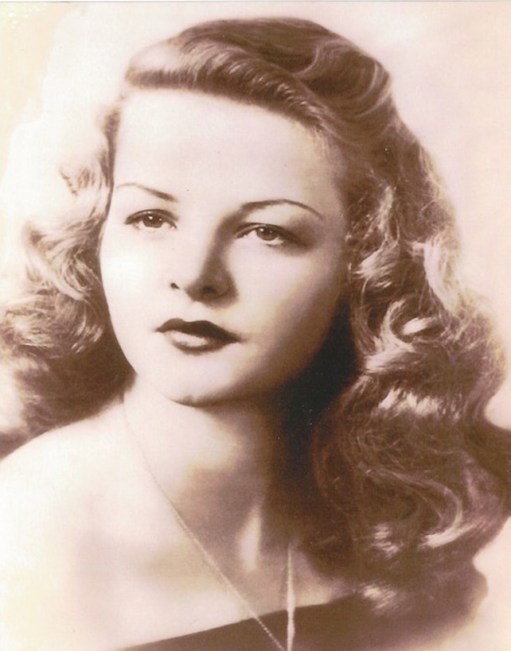
Doreen Hoop at 17
On Aug. 8, 1988, I received in the mail a note from my mom. This is how it opened: “Dear Tom, You have every right to trash this as I feel I am imposing on you. But some of the special characters in my childhood had such an impact on my life, its [sic] like they are urging to write this. It haunts me.”
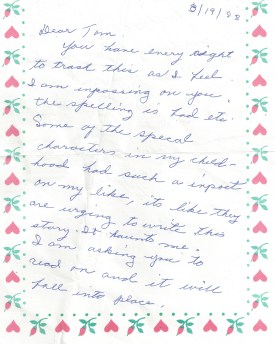
When I reached Mom by phone, she reiterated that she felt compelled to write her life story. “I want to write the truth about my life,” she asserted, “so that no matter what you hear from people who claim to know me, you will know the facts”
A little background: I am the oldest of eight children. Upon earning a Master’s in Journalism at Northwestern University, I elected to stay in Evanston, Illinois. Although I was the only one of my brothers and sisters who lived more than a half hour’s drive from Norwood, the Cincinnati suburb where my father served as vice mayor, mom had insisted that I was the only one she trusted to transcribe her dispatches. Intrigued and flattered, I agreed to her proposition.
From that point, until 1997, when chronic emphysema utterly sapped her energy (she died in 1999), my mom’s installments arrived like clockwork. Riddled with misspellings and teetering on the edge of grammatical coherence, her life story would ultimately encompass more than 300 pages
I wish I could assert that I was equally diligent in transcribing her installments as they arrived, but in truth, I worked on them sporadically for a few months, and then just let them accumulate. I was caught up in all the busy work that defines a man, who, along with his wife, was trying to stake his career in the unstable world of journalism, while also trying to raise three boys.
When my father died in January, 2014, he left behind a rich private and public legacy It was that only then that I realized that my mother’s legacy, her life story, was solely in my hands.
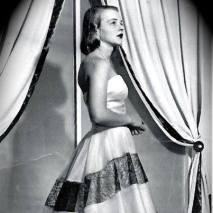
Mom on the runway
She begins her account by asserting that she was fondled at age 11 by a priest at Saint Aloysius, the Cincinnati orphanage where she was sent along with her three older sisters, Rhody, Margie, and Jeannie. “He would put me on his lap and touch me, but Jeannie finally told Sister Margaret and then he stopped,” she writes.
With the exception of this shocking revelation, she has little to say about the four years she lived in the orphanage. She writes that although the nuns “lacked warmth,” they took pains to assure that she and her sisters always had clean clothes. She also explains that she and her sisters were placed in the orphanage because her mother had lost her job as a registered nurse when it was discovered she lacked proper credentials.
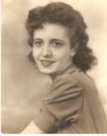
Mom’s older sisters: Rody, Margie and Jeanie (far righ)
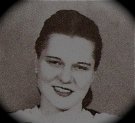
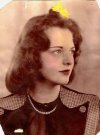
She was 13 when she and her sisters were released from the orphanage. They were reunited with their parents and resumed a more or less normal life. Their mother had found work as a caretaker for several elderly clients. Their father would disappear for days at a time, occasionally returning with small sums of money. (He was later struck and killed by a train under mysterious circumstances.)
Based on her writings, it would seem that mom’s years in high school were consumed by mad crushes on boys, Saturday night dances and one remarkable opportunity: She caught the eye of a fashion buyer at Shillito’s, flagship of Federated Department Stores, Inc., then a fledgling chain. “She [the buyer] said I had the statue (sic) and facial features of a model,” mom writes. “I told my mom I did not want to go back to school that fall because I had a good job. When I told her how much it paid she was all for it.” It was the start of a three-year career as a Shillito’s house model.
In her modeling head shot, she is a composite beauty — Rita Hayworth cheekbones, Judy Garland full lips, and thick, lustrous hair that she described dismissively as “dishwater blonde.” As a runway model for a store aspiring to break into high fashion,she had the opportunity to meet celebrities such as Bob Hope, Benny Goodman and Jimmy Durante.
It was during this time that she learned to dance under her sisters’ tutelage, asserting that she eventually became the best dancer of them all. However, still working as a model in 1946 and becoming increasingly dismayed by the demands of a job that offered little time for a social life (models were routinely enlisted to participate in charitable and promotional events), mom writes that after a chance meeting, she finally snagged a date with Tommy, “my high-school heart-throb, who still managed to show up in my dreams.”
The event was a midsummer dance at Moonlite Gardens, Cincinnati’s premiere dance venue. But, she writes, even as Tommy, witty and urbane, lavished her with attention, she couldn’t take her eyes off a dashing ex-serviceman who “danced like an angel.” That man, Bill Cosgrove, would become my father.
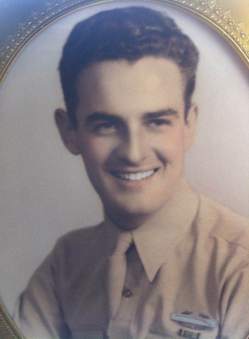
Dad, 1944
Their marriage had an inauspicious start. Mom describes the first night of their honeymoon as “horrible,” and largely blames Dad’s mother, Henrietta, for failing to teach dad how to treat a virgin. “It hurt so bad, I had to grit my teeth,” she writes, “and Bill honestly didn’t know why there was blood on the sheets.”
Now, here’s where it gets complicated. My Mom meets my Dad about one-third of the way into her life story, and it is he, not the childhood friends to whom she previously alluded, who wrests control of her narrative. I suspect that the “truth” she so desperately desired to bring to the light of day was the pernicious evil of “momism,” which the Random House Dictionary defines as “excessive adulation of the mother and undue dependence on maternal care or protection, resulting in absence or loss of maturity and independence.”
In other words, my dad, in the eyes of my mom, was an insipid momma’s boy.Indeed, Mom goes so far as to accuse Henrietta of pressuring Dad to divorce her, arguing that he married beneath his station.
Henceforth, it will be Dad, (and by extension, his frail but seemingly inexhaustible mother), who will “haunt” the remainder of Mom’s life story.
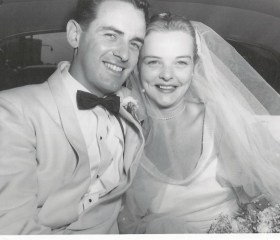
Wedding Day, 1951
She chronicles increasingly dark years marked by undiagnosed bipolar disorder, which entailed numerous hospitalizations and subsequent electroshock treatments; a descent into alcoholism, and, ultimately, a seemingly miraculous recovery when the last in a long list of exasperated psychiatrists threw caution to the winds and prescribed a new and controversial treatment: lithium salts.
II
As an aside, one of my key memories of my childhood, was our move from the small, two-bedroom house in North Norwood, on the crescent of Indian Mound and Sheridan Drive, to the big, brick house on Glenside Avenue, walking distance from the sprawling Chevrolet/Fisher Body assembly plant that dominated downtown Norwood. As characteristic of many communities in southern Ohio at that time, the rich people lived on the “Hill,” while the poorer people lived in the “Valley.”
Although we no longer lived on the Hill, our new house, situated on a block dominated by modest ranch houses and two-flats, evoked wealth. With its majestic oak and beech trees, not to mention the blue spruce tree — thirty feet tall with an almost equal girth — in the front yard, and with its sprawling side yard, our house would become a magnet for nearly every kid in the neighborhood, particularly as mom “blessed” us with a new brother or sister almost yearly.
I can appreciate the toll this took on mom during those years. She writes of the unrelenting time and effort involved in housecleaning, laundry chores and meal preparation. Dad would go to work at Blue Cross every morning as mom began her round of chores. As a seventh grader, I recall running home every day at noon in the company of five brothers and sisters. (Mom insisted that Dad’s income could not support the $5.00 weekly charged by Saints Peter & Paul School for lunch.) Entering the kitchen, I recall gazing upon a small mountain of peanut butter & jelly sandwiches heaped on a serving platter. Complementing the sandwiches was a pot of watered-down Campbell’s condensed something or the other, which mom would ladle into our white, plastic cereal/soup bowls.
This was also around the time that Mom and Dad seemed to stop trying to conceal their arguments from their children. We had grow accustomed to hearing their muffled voices in the bedroom, usually sometime after 10:00 p.m., when they assumed we were asleep. But it reached a point where Mom would usher us through our bedtime rituals around 9:00, kiss us goodnight, and then head back down stairs. Five or ten minutes later we would hear some choice expletive emanating from Dad’s booming baritone voice. In contrast to my short-tempered father, Mom would initially come off as the voice of reason. However, a half hour or so into the argument, Mom would hit some sort of red zone, and literally start screaming. Dad would fall silent, whether in awe of his wife’s fury or because it was an opportunity to disengage and take a breather, I was never quite sure.
Mom writes, “This was around the time I started looking forward to the manhatan [sic] in the evening, only I was having it earlier.” Meanwhile, as she writes, “My dreams were slowly going down the drain.”
The drinking would escalate. “It got to all I could think about was my next bottle,” she writes. “One morning I ran out and walked to downtown Norwood and waited for the liquor store to open.”
My siblings and I share many anecdotes about those “dark” years, when a fairly reliable, if absurdly dysfunctional, pattern held our family in thrall — Mom goes on a manic binge, consumes prodigious amounts of alcohol, threatens or attempts suicide, has a “nervous breakdown,” goes to the hospital for “shock treatments, and then returns home, sober, well-rested, brimming over with love and remorse, and somewhat discombobulated by the two weeks of memory wiped out by near-daily rounds of electroshock therapy. Four or five months later: repeat performance.
Be that as it may, mom had the remarkable capacity to descend into the maelstrom of psychosis, endure repeated shock treatments, and rejoin her family, determined to do better, her conviction bolstered by her knowledge that her children were blessed and walked with the angels. Indeed, By the time I moved to Chicago in 1980, mom had been sober for years and seemed to have an amicable, if not warm, relationship with dad.
III
Henrietta’s death preceded my Mom’s death by only a few years (Grandma lived into her nineties) and I think I can objectively say that Mom and Dad truly began to appreciate each other once she was out of the picture. As I mentioned, Mom had stopped drinking, had finally stopped smoking, and had suffered only one mental health relapse when the same psychiatrist who originally prescribed her lithium tried to transition her to the mood stabilizer, Topiramate. (She went on. a two-day shopping binge, running up $20,000 in credit card debt). As her emphysema worsened, Dad had a lift installed on the stairway and also installed the two big tanks Mom needed for what had evolved into 24/7 supplemental oxygen therapy.
I was nonplussed to come across this 1983 entry. “Once again, I’m thinking of getting a divorce layer [sic] to show Bill that I mean business. But then it goes threw [sic] my mind. Who could I get? Bill is so well known and popular I wouldn’t stand a chance.”
Mom’s last entry wasn’t dated. She writes, “Tom, yesterday was a really bad day for me so I took one of [my brother] Johns [sic] cigarettes and the symptoms [of emphysema] came back worse than ever. I’m going to have to get more nicateen [sic] gum.”
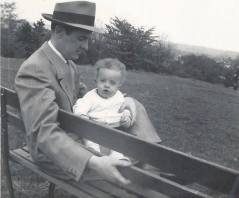
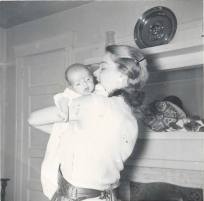
Mom’s death at 74 initially devastated my dad. However, his transition back to the world of the living was remarkably swift. He played golf, lunched with his buddies, and reveled in the adulation and tributes to be expected of a man who starred on Xavier University’s basketball team, who came back from WWII with a Purple Heart, who rose to the upper corporate echelons during his 30 years at Blue Cross, and who served for 35 years as the highly regarded vice mayor of Norwood. He was a devoted family man who took great pains to ensure that his children, grandchildren and great-grandchildren would be taken care of to the best of his abilities. My dad’s legacy is tangible.
Conversely, my mom’s legacy is not all that easy to grasp. I can assure you that she will not emerge as one of those undiscovered writers who garner posthumous accolades. If I were to cobble her “life story” into some semblance of a cohesive narrative and publish it, I have no illusions that it would interest anyone beyond immediate family. However, the irony is not lost on me that I have considered myself a writer ever since mom first praised the illustrated “animal books” I created in third grade, and declared that writing was my special gift. Hearing that as a child made me feel as unique and special as it made me feel decades later when she entrusted me to chronicle the most intimate details of her life.
How can I describe her gift to us, make it tangible? Well, consider the terms of my father’s will. He had eight children and made a point of bequeathing exactly one-eighth of his estate to each of us. Now consider my mother. What I’ve discovered through conversations with my siblings is that mom managed in some near-miraculous way to make each of us — Mary, Bill, John, Theresa, Kathleen, Jerry, Luke and myself — feel like we were the center of her universe. No matter what stumbling blocks life threw in our paths, each of us held securely in our hearts the unshakeable truth that “Mom loves me best.”
Mom was “old school” in her conviction that, by natural right, the man is the head of the household. However, it would be presumptuous of me to say that dad won every battle, particularly those revolving around her children. For example, she stood strong against dad’s insistence that I be named William Thomas, Jr.
“Your name will be Tom,” she writes, “because, after all, Tommy was the boy I loved so much who somehow disappeared from my life but not my heart.”
Dad finally relented, taking her at her word that she had always vowed to name her first son after her favorite apostle, Saint Thomas.
An excerpt of this post was previously published in the winter, 2015, issue of After Hours.
Enjoyed reading this immensely. Although I have no recollection of your mother, I do recollect your father as a rather looming figure. I find it interesting, and relevant, that so many folks struggled with addiction and mental issues during that time when it was largely unspoken. I note this from the hindsight of my own 30 plus years of sobriety, and hearing stories of my mother’s “nervous breakdown” at the age of 18, and how I would sit in my aunt’s car while she went into the psych’s office on Montgomery Rd. to discuss my mother’s brother’s mental state.
I think these stories are relevant and important. Hmm . . . yes perhaps no one would read an entire biography of your mother, but I do think an interesting project might be for a series of essays like yours from the Class of 1966 or there-about from St. Peter and Paul about their growing up times.
LikeLike
Tom, what a heart wrenching and heartwarming rendition of your mom’s life. She fought many demons and I’m truly sorry. Of course, I knew nothing of the challenges in your family, as no one ever knows what goes on behind closed doors. Mental illness was simply not discussed back then. My recollections of your parents were quite positive with your mom standing out as being such a nice lady. Coming from a small family, I was always in awe of the large families in Norwood (and there were a lot of them!). I know I am rambling so I’ll close by extending warm wishes to you and your family. Deb
LikeLike
Thomas J. Cosgrove
December 2 at 11:44pm ·
WordPress
·
o On Aug. 8, 1988, I received in the mail a note from my mom. This is how it opened: “Dear Tom, You have every right to trash this as I feel I am imposing on you. But some of the special characters in my childhood had such an impact on my life, its like they are urging to write this. [ 2,417 more words ]
Image may contain: 1 person , closeup
Like
Like
Love
Haha
Wow
Sad
Angry
CommentShare
21 Jay Brown, David Vincent and 19 others
Comments
5 of 21
View previous comments
Deb Moy
Deb Moy Tom, I sent you a note on the blog, mainly because I didn’t realize I could do it here. Beautifully written. Hard to absorb. I’m so sorry she struggled so much. Warm wishes…
Like · Reply · 10 hrs
Thomas J. Cosgrove
Thomas J. Cosgrove Actually, comments on the blog are better because they go beyond Facebook. In either case, I am so grateful to you for your kind words!
Like · Reply · 10 hrs
Sally Hinkle
Sally Hinkle Dinky, you look so much like your mother. Tina tells me so many stories about your mother and hers. Life is not perfect but how lucky you are to have her soul and her raw emotions written down. Tom, wonderful job.
Like · Reply · 9 hrs
Melissa Vincent Keuffer
Melissa Vincent Keuffer They sure do look similar!! I’ve always thought my mom….especially my sister looked just like my grandma!
Like · Reply · 8 hrs
Beverly McWhorter Boyd
Write a reply…
Choose File
Thomas J. Cosgrove
Thomas J. Cosgrove Thanks, Sally
Like · Reply · 8 hrs
Beverly McWhorter Boyd
Beverly McWhorter Boyd What a beautiful story…even though it was sad at times. I think most women who dedicate their lives to their husband and children feel like her at times…many times! I have heard that marriage is a slow death of self…and adding children to that is even more…dying to ones own dreams and aspirations…that’s not easy and is very depressing and hard to do! Men who are busy working out in the world, meeting, greeting and having “adult” conversations are sometimes unaware of the sacrifices the wife makes to stay home and be that wife and mother! OH my goodness…I could so relate to your Mother’s thoughts and feelings! Yes…I get it and I think other women who have a lot of babies (*I had 8 pregnancies and raised 6, lost 2), home educated our children and was married to a Minister…who was always out “saving” everyone’s family and wayward children…counseling other’s about their marriage problems, visiting the sick, building the church and kind of on a 24/7 work schedule! So I really do get it! Giving the attention (like your mother did) to her children and running a household without help (*maid service and nannies) is a very hard, difficult, physically draining and arduous task and definitely not for the faint at heart! OMGoodness! Your Mom had a life before all this and then she willing virtually became a “slave”…Her heart was in the right place and she wanted to do the right thing but that did not make it any easier physically, mentally and emotionally. She was devoted to your Dad and missed him everyday and longed for the time they could be together again like it was before children…and that day would never return for a very, very long time! Maybe you should write that book…because I really connected to her message! Her heart is torn on “will I walk out on all this chaos and have a life for me or will I stay and be the devoted loving supportive wife and mother I really want to be..but man, this is really hard and I feel so alone in this endeavor!!….???” Not having much encouragement from her Mother in law (*actually, probably a lot of criticism) and a very busy hard working hubby who was devoted to his career…I so understand her turning to the bottle and trying to self medicate, that’s what people do when no one is hearing their cry’s for help! (* suppressed anger produces depression, you know) I have many times looked into the faces of my precious children and thought “Lord, just help me get them raised before I totally lose it!” Nothing I have ever read explained it in such a simple way that I could relate and see myself in her life…trying to cope with becoming invisible, letting go of your own hopes, goals and aspirations for the greater good of your husband and children Boy, can I relate to that !! While dying inside… doing a great job at encouraging and blessing her children on to greatness! I would like to read more of her story. You did an excellent job at relaying it! “The Sacrifice of Mother!” I meet very few women today who are willing to do it! They do what is easiest…and keep their identity and careers. After feeling like I gave it all to my husband and kids and I surprisingly survived! I really thought It would eventually kill me! I think your Mother’s story is one motivated by true, unadulterated LOVE! That is one AMAZING life story! One that would encourage other women in the same situation to carry on and complete the task! Keep writing and I will look forward to hearing more from your truly amazing,dedicated and loving Mother! She was a very strong women…her times of falling off the wagon and in and out of the hospital were cry’s for help and attention as she became just “the wife” and just “the mother” and virtually invisible to the outside world she left to be that devoted wife and mother!.
LikeLiked by 1 person
Tom while eloquently written, it is grossly false almost from the beginning. Fact checking would have been a good ideal. Also this is personal to all of us, it would have been only fair that you should us first. I would love to go over piece by piece where your information is so wrong. This is fition at its best. Adding your own imagination to this isn’t fair to your siblings.
LikeLike